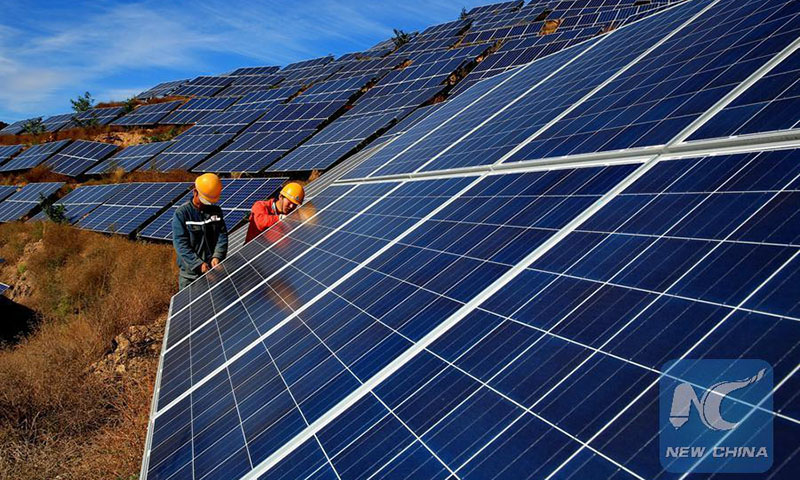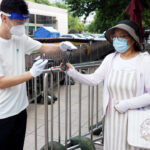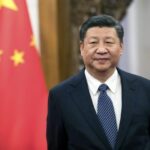Writers from the Helena Kennedy Centre of Sheffield Hallam University, who produced four reports on China’s Xinjiang region about “forced labor” allegations, have been found to be related to terrorist groups, Xinjiang regional government spokesperson Xu Guixiang told a press conference on Tuesday. While debunking lies on Xinjiang, the spokesperson also criticized the US’ groundless sanctions on the region that destabilize the global supply chain, especially in the photovoltaic industry.
The Helena Kennedy Centre at the Sheffield Hallam University issued four reports on Xinjiang to propagate the lie of “forced labor” in China’s Xinjiang region since last May.
The authors of the reports are Laura Murphy and Nyrola, who were revealed by media as having long received funding from government agencies like the US Department of Justice or having openly admitted to have a family member who is a terrorist suspect.
“We have seen too many similar reports that have no credibility or academic integrity, and are a total waste of time to read. Authors of these reports have never come to Xinjiang and do not know the real situation of Xinjiang’s employment. Their reports are lies without any use,” Xu told the press conference.
“Those who published such reports have a malicious purpose and they were accomplices of terrorists. The international community has gotten more knowledge of the truth about the Xinjiang region, and more and more people will not be fooled by the lies of anti-China forces,” Xu said, noting that many people have given positive evaluations of the Xinjiang region’s employment.
At a press conference on July 7, Chinese Foreign Ministry spokesperson Zhao Lijian revealed that the patron of the Helena Kennedy Centre is the founder of an extremist anti-China political group.
The reports published by the center on “forced labor” in Xinjiang have serious mistakes. Some of the citations in the reports have either been proven to be fake news or disinformation spread by the notorious Australian Strategic Policy Institute.
The reports, which endorse the outrageous lie of “forced labor” in Xinjiang, are a disgrace in academic circles, yet they are quoted by anti-China politicians and media in the US to justify the US government’s groundless sanctions on Xinjiang, Zhao said.
Citing “forced labor” accusations, the US passed the so-called Uyghur Forced Labor Prevention Act (UFLPA), which took effect on June 21. It bans products made in China’s Xinjiang, smearing the Chinese government of “oppression” on the Uygurs and other minority populations in Xinjiang.
The act creates a “rebuttable presumption” that all goods partially or wholly produced in the Xinjiang region are “tainted by forced labor.”
It requires corporations to prove with “clear and convincing evidence” that imports from the region are not made by forced labor, which has been criticized by companies and analysts for adding to the costs of companies and disturbing global supply chains.
The International Energy Agency (IEA) recently said that in 2021, China was home to 79 percent of manufacturing capacity for polysilicon. A full 42 percent of that is located in the Xinjiang region, where the country’s largest plant accounts on its own for 14 percent of global capacity, Reuters reported.
Countries need to expand the manufacturing of solar panels from their current base in China to ensure secure supply and meet targets for cutting planet-warming carbon emissions, according to the IEA.
However, analysts warned that the US’ so-called “forced labor” act will destabilize the industry.
Spokesperson Xu told the Tuesday press conference that the concentrated situation of the photovoltaic industry is based on resource distribution, technical gaps and markets.
The current vulnerability of the global industry chain of the photovoltaic industry is because of the US’ so-called forced labor act and its malicious attack on China’s photovoltaic industry.
What the US has done has severely violated the rules of the market and the rules of the World Trade Organization, damaged the internal trade order and disturbed global cooperation in the photovoltaic industry, and hit the global supply chain, Xu said, noting that US companies will also be affected by such an act.
It is known that the photovoltaic industry has never been a labor-intensive industry but a technology- and capital-intensive industry. The companies in the polysilicon sector in China’s Xinjiang have adopted highly automated and digital production with 5G technologies widely used, Xu said, noting that computers can help accomplish most of the work.
Many reporters have visited the production bases of polysilicon in the region. All the companies are registered and operate under the law, and all have fully fulfilled their obligations and responsibility in protecting the rights of employees of all ethnic groups, said Xu.
Promoting the photovoltaic industry and other renewable energy sources is a global consensus and improving cooperation is an inevitable trend, which will not be prevented by any malicious obstruction, said Xu, noting that “if the US wants to sanction the photovoltaic industry in Xinjiang, it should ask whether the global market or US companies will agree.”
Source:- Global Times
Solar panel Photo: Xinhua




